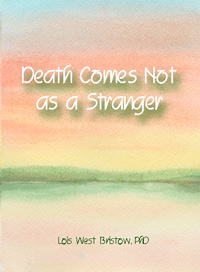No Fear in Death
Author Lois West Bristow on Death Comes Not as a Stranger
What comes to mind when thinking of death? Whatever it is, we feel death is an uncomfortable topic. But what if we could change how we view death into something that could help us live fuller and more fearless lives? What if, instead of being adverse to death, we welcomed it as a natural part of life?
These are the life questions that Lois West Bristow is dedicated to answering, and the Santa Barbara County mother of three attempts to do so in her new book, Death Comes Not as a Stranger. She focuses on Western culture’s obsession with old age and dying, but highlights this phenomenon as a collective denial of aging and dying, and argues that such fears hinder our lives. Drawing on her personal experiences and unique philosophy of death, she leads readers to shift from fearing death to being comfortable with our own mortality.

She recently answered some of my questions about her book and work in depth psychology.
As you mentioned in your book, society is obsessed with the idea of remaining “forever young.” You correlated this obsession to the fear and denial of aging and dying. What do you mean by this?
Our society today focuses on three main things: staying young, staying thin, and staying happy. The first two are characteristics we associate with youth. If we stay young, we just might not get old and die. Continual happiness is a way of denying our other emotions, including fear. Focusing on staying young, thin, and happy is one way of aiming to stop aging and in a sense, postpone death.
Another component is that we have moved so far away from the natural processes of life. There are air conditioners, windowless buildings, and we can even buy our food all packaged! Also, advertisements and photography take beautiful people and air brush out every flaw. Young people grow up seeing these images and begin to believe this is what we want to look like; that this is how we are supposed to live.
Why has Western culture become so adverse to death?
Death is very multi-pronged; a lot of it is documented by the medical community. I believe that when we look at all deaths as a failure on the medical community, we don’t know what to do with it and it perpetuates our fears. The goal of the medical community is to diagnose, treat, cure, and when it doesn’t cure, it is seen as a failure. We don’t know how to separate out people who are dying from a person who is 43, has a heart a heart attack, but receives intensive care and will most likely survive.
We need to learn how to accept death as a natural part of life. We’ll not only be more comfortable with death, but we will learn to live more vital lives!
How does understanding death help us live fuller lives?
We realize the gift of the time. The day becomes a gift to us. We don’t want to just sleep walk through our lives! Not being aware, not doing things that bring us satisfaction, not growing to all that we can become — that is how the fear of death keeps us from living fuller lives.
But learning to be comfortable with death teaches us to develop ourselves and our abilities. Comfort with death shows us that we learn from every single day; we don’t just plow through life. Life is process of learning and growing.
It is your responsibility to live your life, not squander it. Be grateful too.
What role does memory play as part of the transformative process that you discuss in your book?
Memory is fascinating because it is not linear. It can come at any time, in any content, and take you to that experience immediately. You can re-experience any kind of nostalgia. I personally believe that because of how memory has played in my life, when we are ready, memory will come to us in some form. Oftentimes, memory will be holding something back. But it will come back with a different meaning because of how much you know now compared to then.
Memory is a gift as a great teacher for us. The transformative process takes a lot of self-analyzing. If there is something that tends to happen over and over again, write it down and analyze it. Then think deeper about it so that you won’t be stuck in the same place.
To reach that peace with death, you really have to self-analyze to continue developing and understanding things on a deeper level.
You said that you have talked to people who were near death. For the ones that didn’t learn how to accept death as natural part of life, how did they feel about life/death?
Most feel they wasted their lives. Quite.



